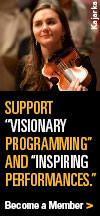Defiant
Sunday, January 22, 2017 at 8:00pm • Church of the Holy Apostles, Manhattan
Beethoven, Bonds, Capers, Adler, Mandrin, Chaplin, Obama, Hong
Artists’ Opening Chords

“The Negro Speaks of Rivers,” by Langston Hughes is a timeless poem, which speaks of the Black American experience. The river’s symbolism is poignant. The birthplace of civilization developed along the banks of ancient rivers such as the Euphrates and Nile. Rivers have played a dynamic role in the sustenance of humanity, and at the same time the river has cycles of flooding that can cause wide-spread destruction. The power of the river is in its movement — constantly flowing — always finding and carving its path.
The musical setting of this Langston Hughes poem, by American composer and pianist, Margaret Bonds, is a meaningful choice in programming for One World Symphony’s Defiant Concert. Rivers are defiant, wild, bold, and persistently move forward. So can be said of humanity and social progress. The beauty of which is no matter the obstruction, the river will find a way around it. Rivers possess strength to erode even the most unyielding obstacles. What is not eroded will be left behind as the river progresses forward.
What greater example of progress is there, especially for Black Americans than the Obamas? For this reason, it is significant for the One World Symphony’s Defiant Concert to premier a musical setting of Michelle Obama’s empowering words from the 2016 presidential campaign trail. Although her words captured the concerns of many, she closed with, “We need you to roll up your sleeves. We need to get to work.” So while we still face major challenges domestically and globally; such as violence against women, wide-spread discrimination, the warming of our planet, and discord amongst nations we must not be discouraged.
As an artist, it is an honor to lend my voice to this progressive program that reminds us that despite the challenges ahead, we can and will overcome.
– Vocalist in Margaret Bonds’ The Negro Speaks of Rivers and Sung Jin Hong’s Michelle Obama: Shaken me to my core, Sonya Headlam performed in the critically acclaimed Great • Atomic • Desire as Daisy in The Great Gatsby and Berlioz’s Le Nuit d’Été.

“It has shaken me to my core in a way that I couldn't have predicted.”
When Sung Jin contacted me about being part of the vocal ensemble for One World Symphony's Defiant program, I was thrilled to have an opportunity to lift up Michelle Obama’s compelling words in musical form. The arts have always been an important venue for the expression of social and political resistance, and One World Symphony particularly stands out as a musical organization that is addressing contemporary social issues.
The First Lady asked of us: “We thought all of that was ancient history, didn’t we? And so many have worked for so many years to end this kind of violence and abuse and disrespect, but here we are in 2016 and we’re hearing these exact same things every day…We are drowning in it. And all of us are doing what women have always done: We’re trying to keep our heads above water, just trying to get through it, trying to pretend like this doesn’t really bother us maybe because we think that admitting how much it hurts makes us as women look weak.
“Maybe we’re afraid to be that vulnerable. Maybe we’ve grown accustomed to swallowing these emotions and staying quiet, because we’ve seen that people often won’t take our word over his. Or maybe we don’t want to believe that there are still people out there who think so little of us as women.”
Michelle Obama’s powerful words highlight the double-bind contemporary women face: speak out about the ongoing and systemic violence, harassment and degradation we face and risk retribution, or swallow the shame and the fear. Either experience can be humiliating, terrifying, and isolating. It can shake you to your core.
But the First Lady also reminded us of the importance of coming together as a community to defend the values of equality and opportunity that Americans hold dear. “We reject hatred and fear, and in difficult times, we don’t discard our highest ideals. No, we rise up to meet them.”
As a musical ensemble, we will rise up together to express these values, defiant.
– Vocalist in Sung Jin Hong’s Michelle Obama: Shaken me to my core, Lauren Porsch performed in the acclaimed uncut production of Peter Grimes and Elektra.

When told about the opportunity to orate Langston Hughes' poem, “Dream Deferred” and perform with One World Symphony, my immediate response was..."of course!" I was particularly intrigued with the title of the program, "Defiant." As an African-American violist, I reflected on how I defy the standard in the classical music genre — a genre rooted in the continuing acknowledgement of white, male contribution.
Sung Jin Hong has thoughtfully curated a program that defies the standard repertoire for classical orchestral music by simply integrating works from women of color in addition to premiering his own compositions that reflect the current social climate. I appreciate this program because it sends the message that it is not enough to just play music for music sake, especially if we expect to live in a more harmonious world. We as musicians, composers, artists must use our mediums to highlight, story-tell, inspire and provoke change. Sung Jin’s decision to create the musical score, Michelle Obama: Shaken me to my core (inspired by her speech delivered on October 13, 2016) is timely due to the current political climate in the U.S. Her speech informs America that there is still work to be done. Mrs. Obama states, “We thought all of that was ancient history, didn’t we? And so many have worked for so many years to end this kind of violence and abuse and disrespect, but here we are in 2016 and we’re hearing these exact same things every day…”
Often times I think people believe time and history run parallel to one another. The idea that because time is moving forward, things must be moving forward and getting better as well. In actuality, there is no law that guarantees that history will continue to progress upward. It is up to us, to be active and unified in creating a future and history we can be proud of.
– Violist and orator Iymaani Abdul-Hamid will make her debut with One World Symphony at DEFIANT

In a time like this where there are many mainstream forces seeking divisive ends it’s necessary to engage with things that remind us of humanity. Music is one of the things all people have in common. We need not learn all the theory behind a piece to enjoy it as a listener and to connect with other people. I’ll be performing a taqsim, which comes from Arabic and Turkish music. When Sung Jin asked me if I’d be interested in playing Arabic music in One World Symphony’s Defiant, I was a tad reluctant, as I was unsure if it was possible for me to do authentically. The advice he offered was simple and encouraging "Please approach your composition as if you were opening a restaurant and wanted to offer real, genuine Syrian cuisines rather than Westernized fusion..." What I’ll perform will be the earnest result of my study of taqsim and the scales (maqam) that it uses. Taqsim is an intimate improvised piece, each performer should seek to express their individual voice when performing and developing their taqsim. I hesitate to try and explain too much about it in writing, while it is a fairly complex style to learn as a performer, from a listeners perspective, as they say: the music speaks for itself. It is my hope that through performing the taqsim, you’ll be inspired to seek out ways to defiantly connect with one another.
– Composer of تَقْسِيم (Taqsim), classical guitarist Rob Adler recently performed in the critically acclaimed Operasodes Hannibal and Breaking Bad — Ozymandias.
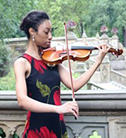
When Sung Jin asked me to participate in One World’s Defiant program I was delighted to accept as I’ve admired the First Lady Michelle Obama ever since 2008 for her grace, intelligence and eloquence. Being able to perform Sung Jin's composition inspired by her speech from October 13, 2016 seemed like the perfect response to the turbulence of recent times. It is a classy way of being “defiant”, like the First Lady herself.
As a teacher/musician I spend a lot of time with other people, acting as a role model or sharing my emotions with others through music. In her speech Michelle Obama speaks frequently about the image that we project not only to children but to other countries. The importance of this can’t be stressed enough. How often have we allowed a small portion of a group define the entire group for us? How many times have we looked at a country and forgotten that a diverse (rather than homogenous) collective makes up the whole? To me, Michelle Obama represents respect and tolerance. This is the image that I wish to portray to others as a teacher, musician, citizen… as a person. One World Symphony, like our country and world, is made up of many different kinds of people who all come together to share and express the joy of music. It’s my hope (possibly defiant) that we can inspire others to set aside their differences in order to come together in a respectful and joyous celebration of life.
– Violinist Allison McNeal has performed Mahler 3 in Alive and Brahms 1, benefitting Holy Apostles Soup Kitchen.
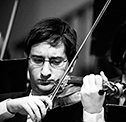
When Sung Jin first asked me to write a piece for One World Symphony's Defiant, I was both honored and concerned — honored that he thought so highly of me to write something; concerned because I was about to leave for a tour in China and had no idea whether I would have time to write. When he recommended writing for solo violin, the first thing everyone thinks of is Bach’s Six Sonatas and Partitas, but as I selected Bejan Matur’s “Night Spent in the Temple of a Patient God” as my reference point, I thought of the other major solo violin sonata collection, Eugene Ysaye’s Six Sonatas, namely the third, “Ballade.” It begins in the manner of a recitative and has no meter, and using that idea, with some knowledge of music and tonality from the region (and while on tour asking a Turkish cellist for suggestions), it felt easier to convey the text: serenity and a prayer-like chant in the temple, a place for reflection of the “beauty of making mistakes and the peace of pain,” the reminders “of god and childhood,” and the call to listen to the music again, perhaps to clarify why the writer speaks to one who chose exile.
– Composer of Sürgün (Exile), Michael Mandrin recently performed in the critically acclaimed Operasode Hannibal and Nordic Holiday, where all proceeds benefitted Holy Apostles Soup Kitchen.
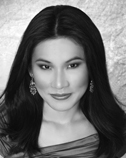
As renowned opera singer Joyce DiDonato illustrated in her recent recital program In War & Peace — Harmony Through Music, “creators of great art have been depicting atrocity and pandemonium side by side with tranquility and equanimity for centuries, boldly showing us both our brutal nature and our elevated humanity.” Sung Jin is one of these brilliant curators. Defiant captures some of the most remarkable voices from the last hundred years and empowers these speeches via music to remind or awake individuals in the midst of chaos. I have always admired how he carries out the mission through his compositions and One World Symphony. For over a decade, they have been bringing powerful music to the community and attracting non-classical music listeners to the door. His compositions particularly bridge contemporary culture and historical literature, reflect the society and its values, and remind us ethics and humanity through music.
– Vocalist in Sung Jin Hong’s Michelle Obama: Shaken me to my core, I-Chun Cheng performed in the critically-acclaimed Operasode Breaking Bad — Ozymandias as Jane and Berg's Lulu, benefitting Holy Apostles Soup Kitchen.
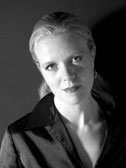
It is 5:00am and Sung Jin wakes me out of deep sleep… it would have been nice to sleep that extra hour. He is really excited about something that he has been up all night working on and he wants to share it with me.
Trying not to disturb our cat Cleo — fast asleep next to me — I gingerly get out of our nice warm bed. Sung Jin doesn’t give me a chance to get some coffee… he just ushers me into his studio and sits me down near the piano. He has his laptop open to a YouTube video of someone who resembles Hitler. Not yet fully awake, I am confused. What is all this about? He clicks play and the Hitler-like figure starts talking. His voice is grounded and he speaks plainly. At first his words are unaccompanied. After a time, Sung Jin starts playing softly on the piano. The text begins to float on top of the music and I almost can’t even tell what came first.
I had never seen Charlie Chaplin’s The Great Dictator before that moment. Premiered in 1940 — while America was still “at peace” with Nazi Germany — it is Chaplin’s satirical condemnation of fascism, racism, neutrality, and intolerance. Although this is Chaplin’s first true film with sound and music, his famous final speech is left scoreless. Chaplin plays a dual role in the film: that of Adenoid Hynkel — the cruel dictator modeled after Hitler — and the Jewish barber who is Hynkel’s doppelganger. Mistakenly identified as the dictator, the barber is put in a position to address the people and soldiers of the warring countries. It is this speech that — 76 years later — so moved Sung Jin to create music for One World Symphony to serve as a collaboration with Chaplin himself.
Listening to Chaplin’s voice grow increasingly emphatic, riding on Sung Jin’s thoughtful score, I was struck by how incredibly timeless and timely Chaplin’s words are. The issues that he outlined are not ones that we have escaped today.
“We have developed speed, but we have shut ourselves in. Machinery that gives abundance has left us in want. Our knowledge has made us cynical. Our cleverness, hard and unkind. We think too much and feel too little. More than machinery we need humanity. More than cleverness we need kindness and gentleness.…”
Words like speed, knowledge, and cleverness could easily be swapped out for internet, social media, or technology and the message would eerily resonate. While the world may have “developed,” we have only really shifted our vista.
These postulations, however, are but a tributary to the heart of Chaplin’s plea. The speech is about humanity — or more specifically, a return to humanity. A return to feeling and kindness. Chaplin’s emotionally-charged words don’t just serve to condemn the failings of our world, but to deliver hope. He requests that we do not despair. He appeals to human emotion and concern. But, perhaps most importantly, he lets us know that WE have the power to be stewards for change:
“You, the people have the power… The power to create happiness! You, the people, have the power to make this life free and beautiful, to make this life a wonderful adventure… let us use that power — let us all unite. Let us fight for a new world — a decent world that will give men a chance to work — that will give youth a future and old age a security. By the promise of these things, brutes have risen to power. But they lie! They do not fulfill that promise. They never will!”
These words could have been printed on a page ripped directly out of the 2016 yearbook.
Similarly, on October 13, 2016, Michelle Obama took the podium in New Hampshire and made an appeal to humanity of her own. Speaking with ardent honesty, she condemned the abuses, degradation, and ill- and unequal treatment of women. Her words cut to the heart of the matter and demanded societal reform. Like Chaplin, she rallied the people to be the custodians for change.
 A couple of nights ago, I came home from work after a long day. Sung Jin asked if I could help him with his new composition — Michelle Obama: Shaken me to my core — by reading sections of the October 13th speech while he played the piano, to see how her words would fit with his music. I skirted around our hungry cat as he ushered me into his studio and, once again, sat me down next to the piano. He put the text in my hand. Sung Jin played and I began to recite the First Lady’s words. Well, at first “recite” was all I was doing. Then I felt something welling up within me. Her message was just too vehement, too important… too true to just “recite.” Supported by Sung Jin’s music I felt myself waking up: feeling passionate, inspired by, and even responsible for the text.
A couple of nights ago, I came home from work after a long day. Sung Jin asked if I could help him with his new composition — Michelle Obama: Shaken me to my core — by reading sections of the October 13th speech while he played the piano, to see how her words would fit with his music. I skirted around our hungry cat as he ushered me into his studio and, once again, sat me down next to the piano. He put the text in my hand. Sung Jin played and I began to recite the First Lady’s words. Well, at first “recite” was all I was doing. Then I felt something welling up within me. Her message was just too vehement, too important… too true to just “recite.” Supported by Sung Jin’s music I felt myself waking up: feeling passionate, inspired by, and even responsible for the text.
While although, sadly, the desired results of Obama’s address were not realized after November 8th, I think that her overarching entreaty will resonate and — hopefully — usher change for years to come.
In a world where we all now have a platform through social media, is it enough to just complain daily about what is wrong in our community… our country… our world… and believe that you are saying something meaningful and therefore making a difference? Where does that get us? I think that it just fosters more angry comments, stress, and bitterness. I understand that so many of us feel powerless to the currents of time and the buffeting winds of history. I’ve always felt that way. Somehow I have always felt that if I go to work everyday and did my best it would be enough. If I came home and did my best by my husband, my cat, my family, my friends, One World Symphony, it would be enough. But, as Michelle Obama said, “This is not something we can ignore. It’s not something we can just sweep under the rug…”
Rather than focusing on the negative without a solution, would it not be better to be an advocate for the positive? To lift up or support the people in your community? To seek out the good and beautiful around us and encourage more of it?
Both Chaplin and Obama go beyond simply stating issues and challenge us to do more. They appeal to our humanity. They encourage us to not despair but to not accept either. With hope, they entreat us to act as instruments of change.
– Vocalist in Sung Jin Hong’s Michelle Obama: Shaken me to my core, Adrienne Metzinger stage directed the critically-acclaimed Operasode Hannibal and The Cunning Little Vixen benefitting the Humane Society of New York.
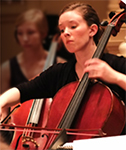
When Sung Jin asked me to participate in One World Symphony's "Defiant," I did not hesitate to accept the invitation. As a musician, I felt a deep need to respond to these recent events artistically. I was especially interested when I heard he was composing music to Michelle Obama’s speech on October 13, 2016.
In 2008, Barack Obama was the first president I ever voted for. I was so inspired by his election, my now-husband and I travelled to Washington, D.C. to witness Obama’s historic inauguration. His 2008 election felt like a great coming-together of America, an embrace of the country’s diverse population.
I continue to hold deep respect for President Obama. The First Lady Michelle Obama has been at least equally as inspirational to me. She is a champion of women’s rights, and recently spoke at length about the inherent value of women’s voices.
“I wanted them to understand that the measure of any society is how it treats its women and girls. And I told them that they deserve to be treated with dignity and respect, and I told them that they should disregard anyone who demeans or devalues them, and that they should make their voices heard in the world.”
At a time when it feels like we have been silenced, we are instead coming together to share a message of hope and unity through music. Our voices will be heard, we will stand strong together. Let’s defy the expectation of divisiveness, and instead stand tall together.
“When they go low, we go HIGH!”
– Principal Cellist Elizabeth Lee Smith has performed in many One World Symphony events serving the local and global communities, including Mahler 5, benefitting the Make-A-Wish Foundation of Metro New York and Mahler & Messiaen, where all proceeds benefitted the Japan Earthquake Relief.

This election made me sad and disappointed — with all the negative talk about women and non-white people. We should treat everyone as an equal. Our First Lady gave a great speech and it was very motivating. It taught me that we need to get to work and stand up for other people. Remember, it’s all up to us.
– Making his debut with One World Symphony, 11-year-old Cameron Wright will be performing in Michelle Obama: Shaken me to my core by Sung Jin Hong.

One World Symphony is creating a visionary program with timely compositions that tap into current cultural and political climate. The organization is giving both audience and musicians the opportunity to briefly escape our current discordant world and instead celebrate our common humanity. I am personally honored to be singing a chamber piece called “Winter” from Valerie Capers' Song of the Seasons cycle. A Bronx native, Ms. Capers is a brilliant jazz musician and was the first blind graduate of Juilliard. Though the piece begins on a somber, wintry note, it ends with an uplifting message in anticipation of the return of spring. As America navigates this divisive winter season, it is my fervent hope that we can emerge quickly to reclaim our spring.
– Vocalist in Valerie Capers' "Winter" from Song of the Seasons and Sung Jin Hong's Michelle Obama: Shaken me to my core, Laura Farmer performed in the complete production of Ariadne of naxos and Mad Women benefitting The Breast Cancer Research Foundation
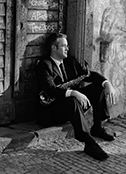
“Disobedience, in the eyes of anyone who has read history, is man’s original virtue. It is through disobedience and rebellion that progress has been made.” – Oscar Wilde
Merriam-Webster defines "defiant" as: full of or showing a disposition to challenge, resist, or fight.
Synonyms include: rebellious, incompliant, disobedient, unruly. I believe one would be hard pressed to find moments of progress, innovation, heroism, genius, or courage that lacked a component of defiance.
Western Music’s evolution can largely be seen as a succession of defiance. Nearly 1,700 years ago musicians defied Plato’s musical idealism by replacing the sonority of a flute with a harp. In the centuries following, defiance came in the form of altering conventional song-form, incorporating previously admonished harmonic dissonance, unconventional meter, and continuously pushing the boundaries of what was considered “music”. Music itself has also been universally utilized as a vehicle of defiance. Topics too taboo for their time have always materialized in the arts through those brave enough to defy what was “acceptable”. During times of injustice, oppression, and censorship, music has been a weapon of the oppressed to speak truth to power, preserve historical record, mobilize, and communicate.
“During times of universal deceit, telling the truth becomes a revolutionary act.” –George Orwell
I was told that prior to approximately 1970, students in the United States were taught “civics”: The study of the rights and duties of citizenship. Though it may still be taught, it has been largely replaced by “social studies.” I bring that up because, to many, the word “defiant” may have negative connotations. When I asked myself why that is, my only conclusion was that it was what we were taught (or not taught). In reality, the founders of our nation were defiant in every sense of the word, and took steps to protect the citizenry’s ability to be defiant as well (they literally wrote it down). But it seems that in the oligarchic world we live in today, efforts have been taken to forget that.
“Eternal vigilance is the price of liberty.” – Thomas Jefferson
Today we find ourselves in a place where, among other things: peaceful protest is an arrestable offense, there are at least two-tiers of justice, propaganda masquerades as fact, Habeas Corpus (written into the Magna Carta requiring that a jailed person be charged with a crime) ended in the United States in 2011, and half of our population does not exercise their right to vote. We have the highest rate of childhood poverty in the developed world, half of all U.S. citizens are poor or living in poverty, and the level of income inequality is greater than “The Gilded Age” preceding the Great Depression.
I bring these things up because I believe they are issues that should warrant as much public outcry as has been seen in the weeks following our election. The lack of passionate, unified defiance to these issues implies to me that we as a people did not collectively decide that that was the course we desired for ourselves. We did not actively make those choices, but rather we passively allowed them to be decided for us. I believe we have arrived here because we have collectively neglected our civic duty of vigilance.
But you know what? Since this past election I have seen the flames of vigilance reigniting, and people becoming engaged for either the first time, or the first time in a long time. We no longer have the flowery rhetoric that has placated us for too long. We have long had many very offensive issues, and we now have a face to match. There has never been a time in our history when we as a people have risen as one and not succeeded. That success has never been easy, painless, or perfect, but as Dr. Martin Luther King, Jr. said, “Freedom is never voluntarily given by the oppressor; it must be demanded by the oppressed.”
In my lifetime, now more than ever I feel it is vital that we, the people, use this opportunity to fan the flame of vigilance. And in today’s climate, I believe that “vigilance” can be seen as “defiant”. But we must remember that “defiant” is not necessarily a negative word. We would not be here without it.
I’d like to express my gratitude and solidarity to Sung Jin Hong and One World Symphony. Through music, you continue to unify so many immensely talented and passionate people. Only light can defeat darkness, and I consider Sung Jin and The One World Symphony to be a very bright light. Thank you for bringing us together, and allowing us to show our vigilance through Defiant.
“The ultimate measure of a man is not where he stands in moments of comfort and convenience, but where he stands at times of challenge and controversy.” – Martin Luther King, Jr.
– Resident saxophonist Bradley Bloom recently performed in Operasode Hannibal and Love Brunch for Holy Apostles Soup Kitchen.
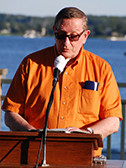
Ramakrishna-Vivekananda Center of New York is excited to be part of One World Symphony’s DEFIANT concert. It was truly an honor for our choir to be invited to perform because we deeply believe in the core values that are at the heart of this great New York musical institution. That is also why, on the occasion of Swami Vivekananda’s 150th Birthday in 2012, we chose One World Symphony and Sung Jin Hong to create the highlight of our year-long Tribute to the Spiritual Unity of Humankind. For that program, we commissioned The Architect, a symphonic poem by Sung Jin Hong. For DEFIANT our choir performs the traditional Sanskrit song, “Mahishasura Mardini.” According to the Indian spiritual tradition, life on both the individual and societal levels, can be described as an ongoing battle between the pairs of opposites: the forces of light and darkness, truth and falsehood, good and evil. As depicted in the Durga Saptashati (Chandi), a Sanskrit work, the multi-armed Divine Mother of the Universe (Durga) — representing the dynamic power that animates the universe — leads the battle of life to vanquish the apparently invincible great buffalo-demon Mahishasura. “Mahishasura Mardini” celebrates our victory over the negative forces, with the blessings of the Divine Mother.
 (partial translation) O daughter of the mountains, who makes the whole world happy, who makes all the universe rejoice, who defeats the undisciplined,
who is ever rejoicing, who nourishes the three worlds, who removes sins, whose wrath befalls the progeny of the demons, who destroys those drunk on the intoxicant of pride, O Mother of the World, Victory, Victory to Thee.
(partial translation) O daughter of the mountains, who makes the whole world happy, who makes all the universe rejoice, who defeats the undisciplined,
who is ever rejoicing, who nourishes the three worlds, who removes sins, whose wrath befalls the progeny of the demons, who destroys those drunk on the intoxicant of pride, O Mother of the World, Victory, Victory to Thee.
We eagerly look forward to DEFIANT with our hope and conviction that through this concert, One World Symphony and its extraordinarily creative Director, Sung Jin Hong, will take us one more meaningful step toward a more peaceful and united world.
– Swami Vidananda (Defiant, “Mahishasura Mardini”) and Ramakrishna-Vivekananda Center of New York presented One World Symphony’s critically-acclaimed Ecstasy and commissioned Sung Jin Hong’s The Architect (2012)
Sunday, January 22, 2016 at 8:00 p.m.
Holy Apostles Church
296 Ninth Avenue at West 28th Street
Manhattan




